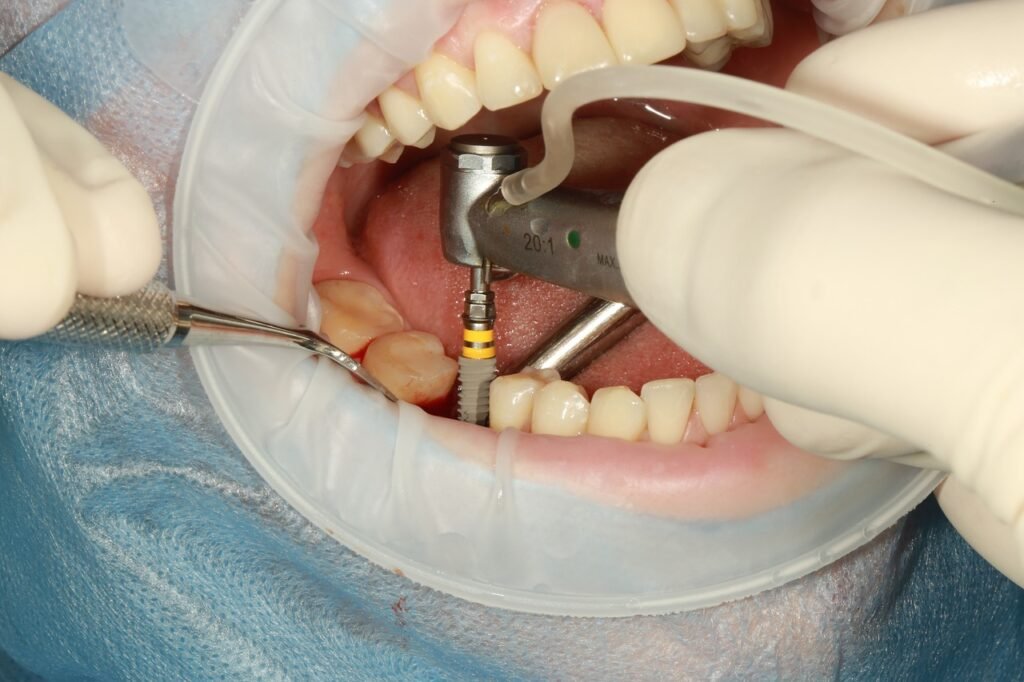
8 signs that you need dental implants
Dental implants have revolutionized the world of dentistry by offering a highly effective solution for people dealing with tooth loss, damaged teeth, or oral discomfort. They not only restore the functionality of your teeth but also ensure your smile stays bright and natural-looking. If you are struggling with missing or damaged teeth, it is crucial to know when you might need dental implants. In this article, we will discuss 8 signs that you need dental implants, how they work, and how they can improve your oral health and overall quality of life.
What Are Dental Implants?
Before we delve into the 8 signs that you need dental implants, it’s important to understand what dental implants are. Dental implants are artificial tooth roots that are surgically placed into the jawbone. They serve as a foundation for replacement teeth or bridges. Made from titanium, which integrates well with bone, dental implants provide a sturdy, natural-looking solution to tooth loss.
Unlike dentures or bridges, dental implants fuse directly with the bone, offering a stable and permanent replacement. This integration process, known as osseointegration, provides a secure foundation for the artificial tooth or bridge, which ensures that they function like natural teeth.
1. You Have Missing Teeth
Missing teeth can significantly affect your quality of life. Whether due to decay, injury, or gum disease, losing a tooth can lead to discomfort and self-esteem issues. If you have gaps in your smile or teeth that are difficult to replace, this is one of the clear 8 signs that you need dental implants.
The space left by a missing tooth can cause your remaining teeth to shift, leading to misalignment. Over time, this may impact your bite and lead to further complications, such as jaw pain or excessive wear on your remaining teeth. Additionally, gaps in your smile can make it harder to speak or eat comfortably, leading to frustration and reduced confidence.
Dental implants are an excellent way to fill these gaps. They not only restore your smile but also maintain the structure of your mouth by preventing the shifting of surrounding teeth. With implants, you can restore the full functionality of your teeth and enjoy eating, speaking, and smiling without any discomfort.
2. You Struggle with Chewing or Eating Certain Foods
Eating can become a significant challenge when you have missing or damaged teeth. You may find it difficult to chew certain foods, such as apples, steak, or corn on the cob, which can affect your nutrition and overall health. If you’re frequently avoiding these foods because of dental issues, it might be time to consider implants.
Implants function like natural teeth, providing a solid foundation for chewing and biting. Once in place, dental implants help you eat all kinds of foods with ease, eliminating the discomfort or difficulty you might experience with partial dentures or other temporary solutions. If you’ve been struggling with eating certain foods, dental implants can restore your ability to enjoy a variety of meals again.
3. Your Dentures Are Uncomfortable or Don’t Fit Well
Dentures have been a popular option for replacing missing teeth, but they often come with their own set of issues. Ill-fitting dentures can cause irritation, sores, and discomfort. They may slip out of place while eating or speaking, leading to embarrassment and frustration. If you’re experiencing these issues with your dentures, this is another of the 8 signs that you need dental implants.
Dental implants offer a permanent solution that doesn’t require adhesives or the constant need for adjustments. Implants are securely anchored into the jawbone, providing stability and eliminating the discomfort associated with dentures. Implant-supported dentures can also be a more comfortable and stable alternative to traditional dentures, offering you the confidence to speak, eat, and smile without fear of them shifting or falling out.
4. You Are Experiencing Jawbone Deterioration
A crucial function of your natural teeth is stimulating the jawbone through chewing and biting. When you lose a tooth, the jawbone in that area no longer receives stimulation, which can lead to bone loss over time. Jawbone deterioration not only affects the appearance of your face but can also make it more difficult to fit dentures or other dental appliances. Jawbone loss is one of the most important signs that you need dental implants.
Dental implants help prevent further bone loss by mimicking the function of natural tooth roots. As the implant fuses with the jawbone during the osseointegration process, it stimulates the bone, preventing atrophy and helping to maintain the natural contours of your face. By opting for implants, you’re not only restoring the appearance of your teeth but also ensuring the long-term health of your jawbone.
5. You Notice Changes in Your Facial Appearance
If you’ve experienced tooth loss or significant decay, you may have noticed changes in the appearance of your face. Without the support of teeth, the structure of your face can begin to change, leading to a sunken, aged appearance. Missing teeth can cause your lips to lose volume, and your cheeks may look hollow due to the loss of support.
Dental implants help restore the natural shape and structure of your face by providing the necessary support for your soft tissues. By filling in the gaps caused by missing teeth, implants prevent the face from appearing sunken or sagging. This restoration not only improves your facial aesthetics but also boosts your self-confidence, allowing you to smile freely without worrying about your appearance.

6. You Have Severely Cracked or Damaged Teeth
Teeth can become cracked or damaged due to trauma, decay, or wear and tear over time. In some cases, fillings or crowns may be sufficient to restore the tooth’s function, but in more severe cases, the tooth may be beyond repair. If you have severely damaged or cracked teeth that cannot be salvaged, dental implants may be the best option.
Implants are a permanent solution for replacing damaged teeth. They are custom-designed to match your natural teeth in both appearance and function, allowing you to enjoy a full, healthy smile once again. Unlike other restorative options, implants do not rely on adjacent teeth for support, making them a more reliable and lasting solution.
7. You’re Dealing with Infected or Decayed Teeth Beyond Repair
Severe tooth decay or infection can lead to tooth loss if not addressed promptly. In some cases, a root canal or other treatments may help save the tooth, but when the infection or decay is too severe, extraction becomes necessary. Tooth decay or infection beyond repair is one of the signs that you need dental implants.
After tooth extraction, dental implants can be placed in the same area, filling the gap and restoring the function of your mouth. Implants help to prevent further oral health issues by stabilizing the surrounding teeth and maintaining the jawbone structure. With dental implants, you can restore the health and functionality of your teeth, even after severe decay or infection.
8. You Experience Speech Issues Due to Missing Teeth
Missing teeth, particularly those at the front of your mouth, can affect your ability to speak clearly. Gaps in your smile may cause you to mispronounce words, leading to self-consciousness or difficulty communicating effectively. If missing teeth have impacted your speech, it’s time to consider dental implants.
Dental implants restore the natural alignment of your teeth, improving not only your smile but also your ability to speak confidently. Unlike dentures, which can slip while talking, implants are securely anchored in the jaw, offering stability and preventing speech issues. By opting for dental implants, you can regain your ability to communicate clearly and confidently.
FAQs About 8 signs that you need dental implants
Q: How painful is the dental implant procedure?
A: Most patients report minimal discomfort during the procedure, as local anesthesia is used. After the procedure, some swelling and soreness are typical, but these symptoms can be managed with over-the-counter pain medications.
Q: How long do dental implants last?
A: Dental implants are designed to last a lifetime with proper care. The titanium material used is highly durable and integrates well with the jawbone, making it resistant to decay and wear.
Q: Are dental implants suitable for everyone?
A: Dental implants are suitable for most people in good overall health with healthy gums and sufficient bone density. However, people with certain health conditions or inadequate bone structure may need additional treatments, such as bone grafting.
Q: How long does it take to get dental implants?
A: The process typically takes several months. After the implant is placed, the healing process allows it to fuse with the bone (osseointegration), which can take 3-6 months. Afterward, the final restoration (crown or bridge) is placed.
Q: Does insurance cover dental implants?
A: Some insurance plans may cover part of the cost of dental implants, though coverage varies. It’s important to check with your insurance provider to understand the details of your plan.
Q: How should I care for my dental implants?
A: Caring for dental implants is similar to caring for natural teeth. Regular brushing, flossing, and routine dental check-ups are essential for maintaining the health and longevity of your implants.
Conclusion
Dental implants offer a life-changing solution for individuals struggling with missing or damaged teeth. If you experience any of the 8 signs that you need dental implants, consulting a dental professional can help you determine the best course of action. Implants provide a permanent, natural-looking solution that restores the function, comfort, and appearance of your teeth. With their long-lasting benefits, dental implants can significantly improve your oral health and overall well-being.







